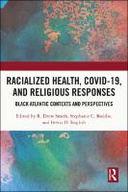Explore

Racialized Health, COVID-19, and Religious Responses
0 Ungluers have
Faved this Work
Login to Fave
This volume draws attention to multiple ways black health prospects and outcomes are configured by the actions, inactions, and cultural capital of social institutions and leaders, including within the governmental sector, the healthcare sector, and the religious sector. Facilitating and ensuring conditions conducive to public health, and capacities for provision of public healthcare, are macro tasks, requiring substantial institutional, financial, and technological resources. Government sectors and healthcare sectors around the globe are where this scale of resources are concentrated, though in varying degrees reflective of global wealth disparities. As these disparities and inequities have become increasingly evident, including as a result of the COVID-19 crisis, it has become more urgent to hold sectors charged with public health accountable in fulfilling their public charge. Racialized Health, COVID-19, and Religious Responses: Black Atlantic Contexts and Perspectives explores black religious responses to black health concerns amidst persistent race-based health disparities and healthcare inequities. This cutting-edge edited volume provides theoretically and descriptively rich analysis of cases and contexts where race factors strongly in black health outcomes and dynamics, viewing these matters from various disciplinary and national vantage points. The volume is divided into the following four parts: Systemic and Socio-Cultural Dimensions of Black Health Ecclesial Responses to Black Health Vulnerabilities Public Education and Policy Considerations Spirituality and the Wellness of Black Minds, Bodies and Souls Part I explores ways social and cultural factors such as racial bias, religious conviction, and resource capacity have influenced and delimited black health prospects. Part II looks historically and contemporarily at denominational and ecumenical responses to collective black health emergencies in places such as Nigeria, the UK, the US, and the Caribbean. Part III focuses on public advocacy, particularly collective black health, both in terms of policy and education. The final section deals with spiritual, psychological, and theological dimensions, understandings, and pursuits of black health and wholeness. Collectively, the essays in the volume delineate analysis and action that wrestle with the multidimensional nature of black wellness and with ways broad public resources and black religious resources should be mobilized and leveraged to ensure collective black wellness.
This book is included in DOAB.
Why read this book? Have your say.
You must be logged in to comment.
Editions

